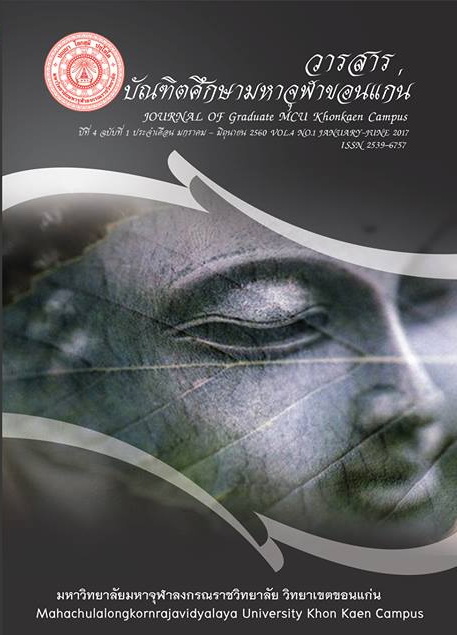ประเพณีบุญข้าวสาก จังหวัดขอนแก่น
Main Article Content
Abstract
บทความนี้มีวัตถุประสงค์เพื่อศึกษาความเชื่อประเพณีบุญข้าวสาก และขั้นตอนของพิธีกรรมบุญข้าวสาก มีความสัมพันธ์กับวิถีชีวิต ของชาวจังหวัดขอนแก่น
ความเชื่อประเพณีบุญข้าวสาก เป็นประเพณีที่ชาวอีสานได้ทำกันในวันขึ้น 15 ค่ำ เดือน 10 ของทุกปี ซึ่งเป็นประเพณีที่ชาวอีสานทำบุญไปหาผู้ตายหรือผู้ที่ล่วงลับไปแล้ว เพราะเชื่อว่าผีบรรพบุรุษจะมีความหิว กำลังรอส่วนบุญจากงานนี้ เมื่อถึงงานบุญจึงพากันทำอย่างศรัทธานำไปถวายพระสงฆ์-สามเณร และอุทิศส่วนบุญกุศลแก่ผู้ตายและเปรตกระทำด้วยศรัทธาบุญกุศลก็จะหนุนให้มีความสุขจนสู่พระนิพพาน
ความสัมพันธ์ระหว่างประเพณีบุญข้าวสากกับวิถีชีวิตของชาวจังหวัดขอนแก่นแบ่งเป็น 2 กลุ่ม คือ ความสัมพันธ์ระหว่างประเพณี และวิถีชีวิตส่วนบุคคล อันได้แก่ผู้เข้าร่วมพิธีกรรมครอบครัว เครือญาติ หมู่บ้าน และความสัมพันธ์ระหว่างประเพณีพิธีกรรมกับวิถีชีวิตส่วนรวม ได้แก่ สังคม เศรษฐกิจ และสิ่งแวดล้อม คติความเชื่อและพิธีกรรม บุคคลที่เกี่ยวข้องกับพิธีกรรมมีความเชื่อว่าการได้ร่วมพิธีกรรม เป็นการแสดงออกถึงความกตัญญูต่อบรรพบุรุษและผีตาแฮก ทำให้มีจิตใจเบิกบานได้กุศล
This aim of this paper was to study the belief of rice tradition (Boon Khoa Sak) and the stages of the rice tradition ceremony in relation to the lifestyle of Khon Kaen residents.
Based on the study of the belief related to the rice tradition ceremony, the ceremony is normally taken place on the full moon day of September each year. It is the tradition the Isan people usually conduct meritorious deeds to dedicate merit to those who already passed away because of their belief that the ancestor ghosts are hungry and waiting for a part of merit gained from this ceremony. Therefore, Isan people participate in the ceremony with faith to offer the requisites to the Sangha (monks and novices) and dedicate the merit to the dead and hungry ghosts with the belief that this merit will help them to gain happiness and attain nirvana in the future.
The relationship between the rice tradition and Khon Kaen residents’ lifestyle can be categorized into two groups: namely, relationship between the tradition and personal lifestyle viz. participation in the ceremony is a part of the family, relative and village activities; relationship between the tradition and social lifestyle as it is the activity of the society, economy and environment. In term of belief and ritual, the related persons believe that participating in the ceremony is the way to express their gratitude towards their ancestors and the rice field protective ghost (Phee Ta Haek); and to obtain happiness and merit.

